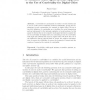ATAL
2007
Springer
14 years 5 months ago
2007
Springer
Conviviality is a mechanism to reinforce social cohesion and a tool to reduce mis-coordination between individuals, groups and institutions in web communities, for example in digit...
ATAL
2007
Springer
14 years 5 months ago
2007
Springer
Criminal behaviour often involves a combination of physical, mental, social and environmental (multi-)agent aspects, such as neurological deviations, hormones, arousal, (non)empat...
HICSS
2007
IEEE
14 years 5 months ago
2007
IEEE
Studies of Internet use continue to show a gap between those with and without access to the Internet and its resources. However, recent work indicates that this is not a straightf...
KBSE
2008
IEEE
14 years 5 months ago
2008
IEEE
Open-source development, social production, social networks and other factors change the way we understand software systems. The paper motivates the use of social thinking to desi...
CHI
2010
ACM
14 years 6 months ago
2010
ACM
In this paper we describe the results of a controlled study of a social game, Magpies, which was built on the Facebook Online Social Network (OSN) and enhanced with contextual soc...
RECSYS
2009
ACM
14 years 6 months ago
2009
ACM
Social network sites rely on the contributions of their members to create a lively and enjoyable space. Recent research has focused on using personalization and recommender techno...
PETRA
2009
ACM
14 years 6 months ago
2009
ACM
The digital divide refers to a lack of technological access, part of which involves exclusion from a blooming arena of social interaction. People without mobile phones or PCs cann...
HT
2009
ACM
14 years 6 months ago
2009
ACM
The Social Web is successfully established and poised for continued growth. Web 2.0 applications such as blogs, bookmarking, music, photo and video sharing systems are among the m...
QI
2009
Springer
14 years 6 months ago
2009
Springer
Abstract. Information systems are socio-technical systems. Their design, analysis and implementation requires appropriate languages for representing social and technical concepts. ...
IVA
2009
Springer
14 years 6 months ago
2009
Springer
Abstract. The challenge of making a virtual world believable includes a requirement for AI entities which autonomously react to a dynamic environment. After the breakthroughs in be...







